2025届高考英语复习 简单句基本句型 课件(共36张)
文档属性
| 名称 | 2025届高考英语复习 简单句基本句型 课件(共36张) |  | |
| 格式 | ppt | ||
| 文件大小 | 1.2MB | ||
| 资源类型 | 教案 | ||
| 版本资源 | 人教版(2019) | ||
| 科目 | 英语 | ||
| 更新时间 | 2025-05-12 14:39:23 | ||
图片预览


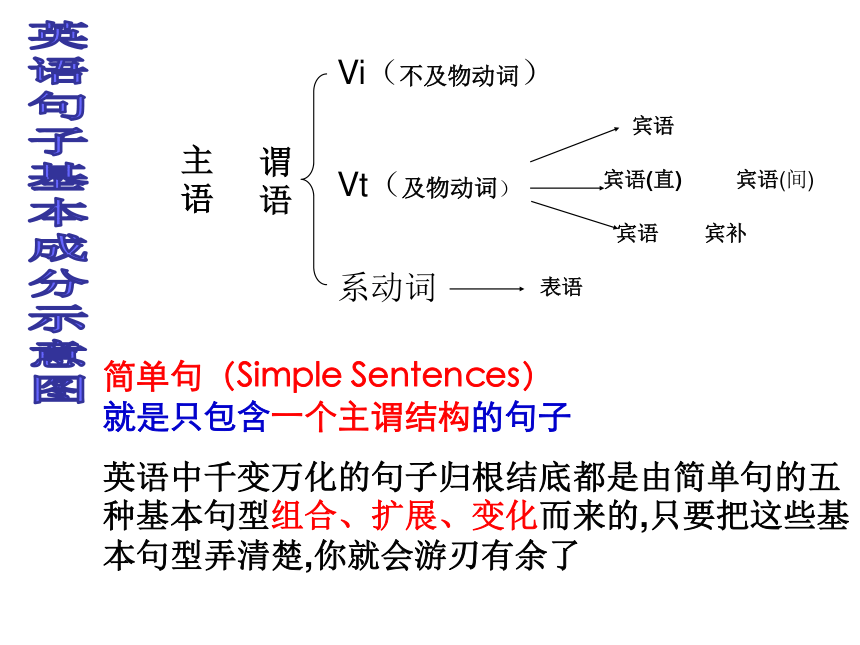
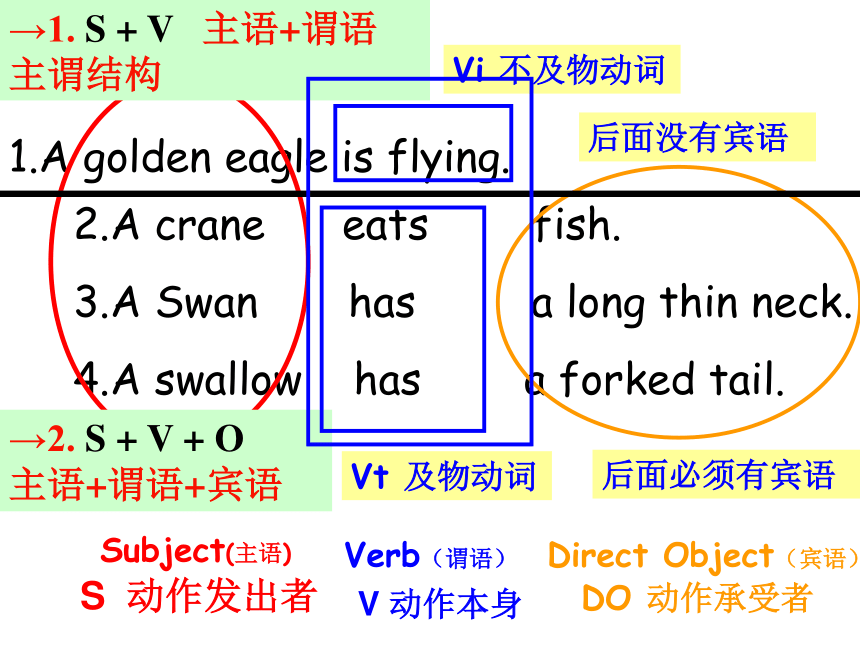
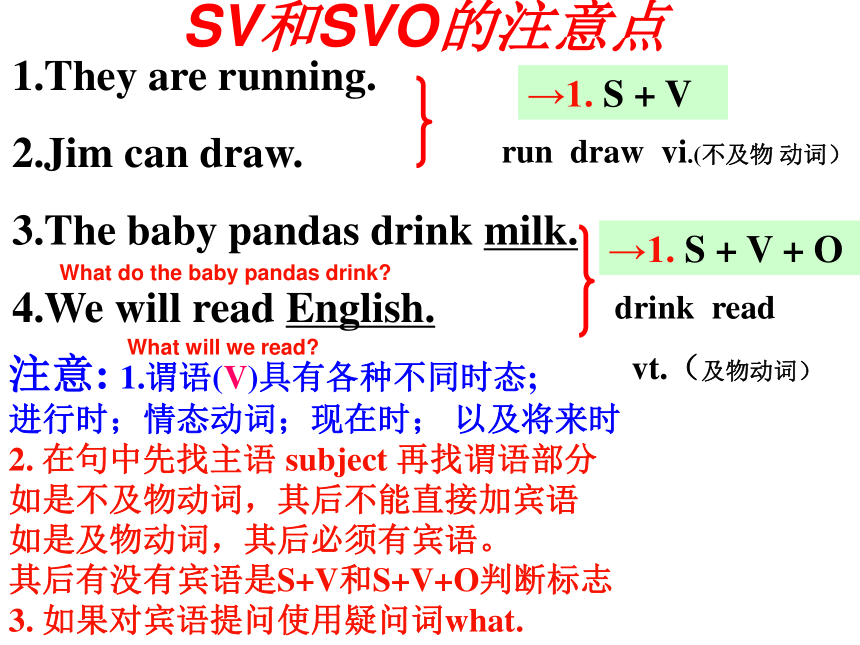
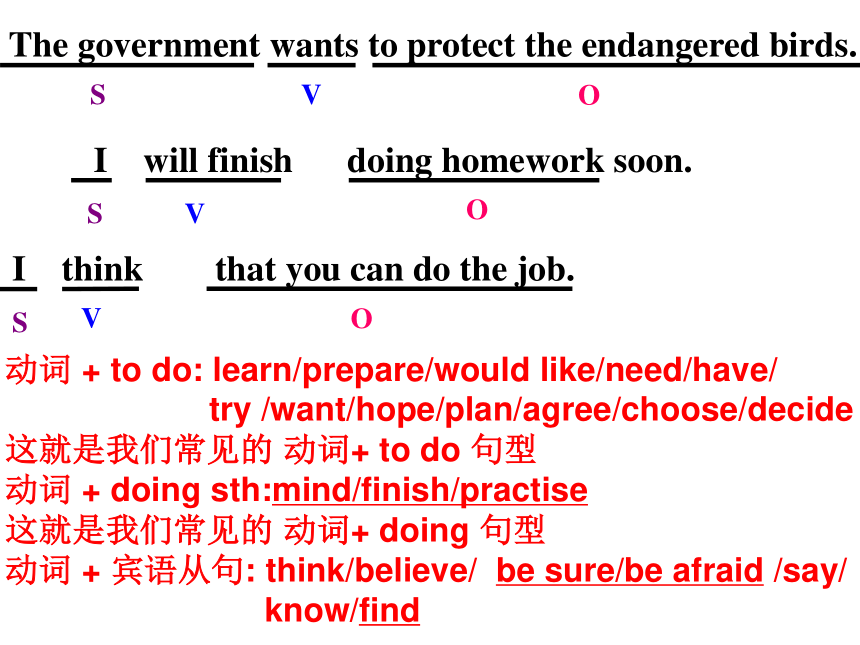
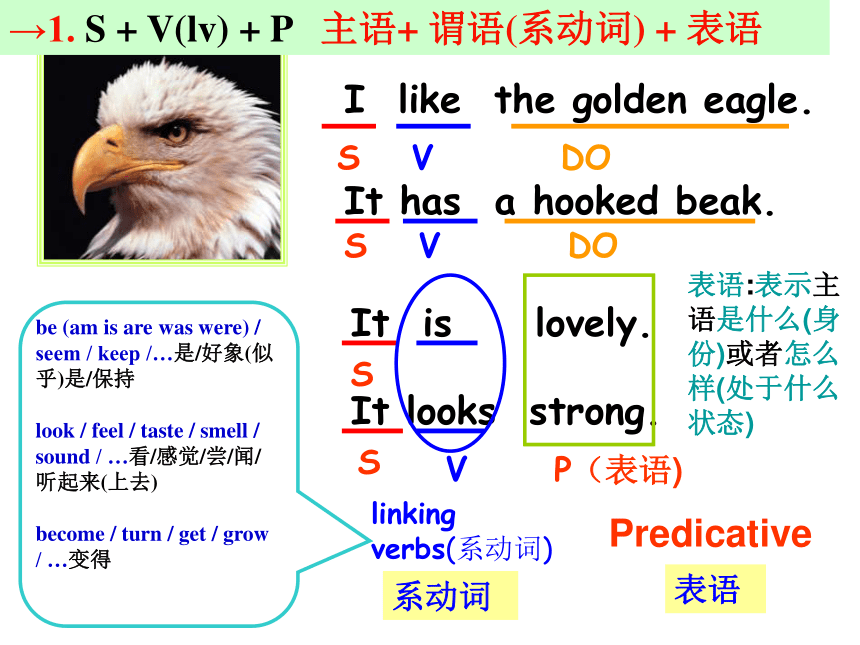
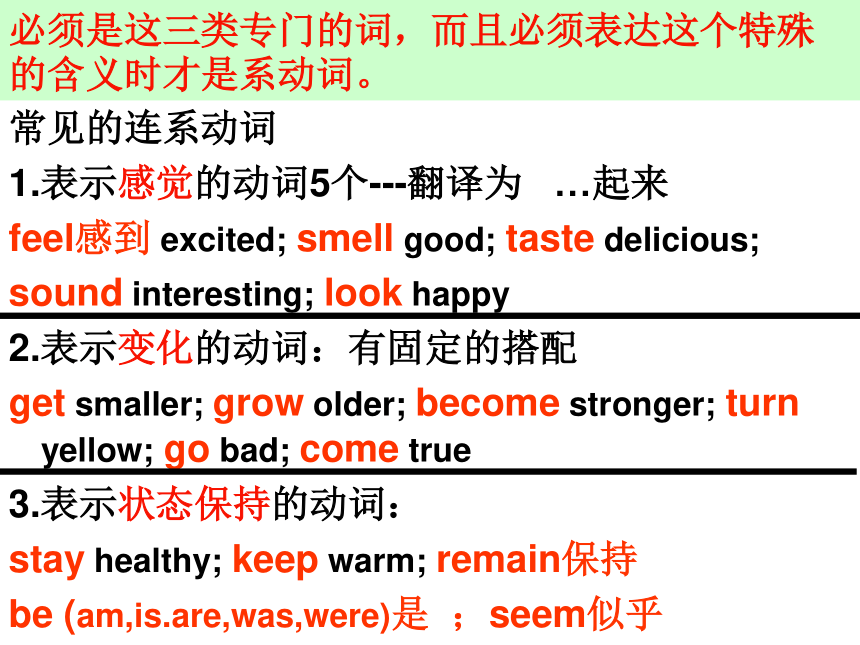

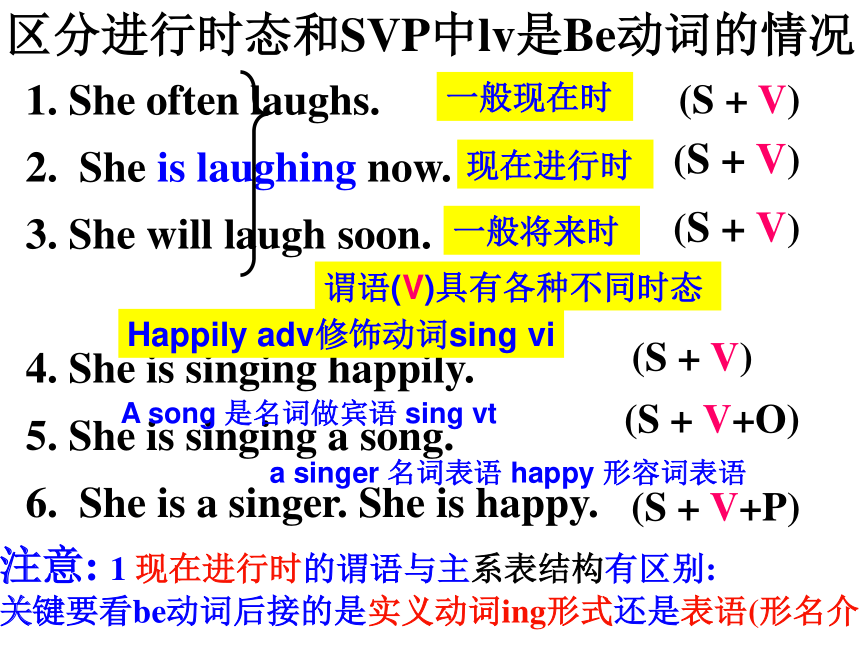
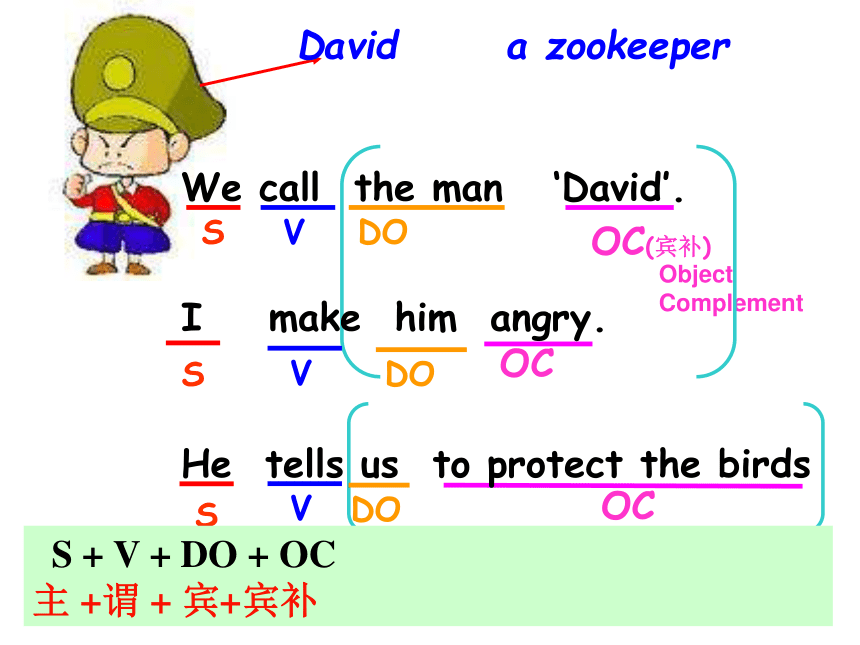
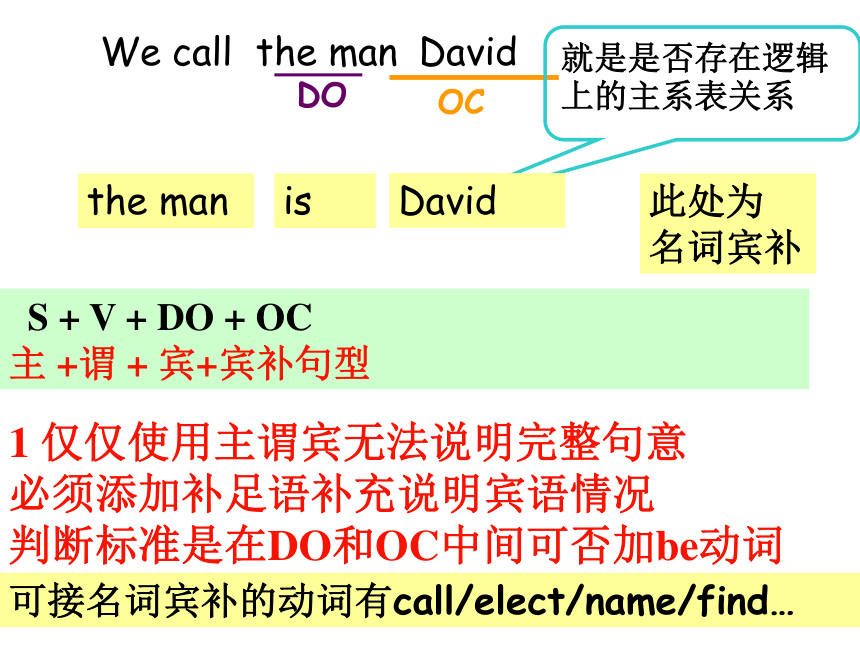
文档简介
(共36张PPT)
简 单 句
基 本 句 型
英语句子的种类(按结构)
简单句 (simple sentence)
并列句 (compound sentence)
复合句 (complex sentence)
主语
谓语
宾语
宾语
宾补
表语
宾语(间)
宾语(直)
Vt(及物动词)
系动词
Vi(不及物动词)
简单句(Simple Sentences)
就是只包含一个主谓结构的句子
英语中千变万化的句子归根结底都是由简单句的五种基本句型组合、扩展、变化而来的,只要把这些基本句型弄清楚,你就会游刃有余了
2.A crane eats fish.
3.A Swan has a long thin neck.
4.A swallow has a forked tail.
1.A golden eagle is flying.
Subject(主语)
S 动作发出者
Verb(谓语)
V 动作本身
Direct Object(宾语)
DO 动作承受者
→1. S + V 主语+谓语 主谓结构
→2. S + V + O 主语+谓语+宾语
Vi 不及物动词
后面没有宾语
Vt 及物动词
后面必须有宾语
SV和SVO的注意点
1.They are running.
2.Jim can draw.
3.The baby pandas drink milk.
4.We will read English.
run draw vi.(不及物 动词)
drink read
vt.(及物动词)
注意: 1.谓语(V)具有各种不同时态;
进行时;情态动词;现在时; 以及将来时
2. 在句中先找主语 subject 再找谓语部分
如是不及物动词,其后不能直接加宾语
如是及物动词,其后必须有宾语。
其后有没有宾语是S+V和S+V+O判断标志
3. 如果对宾语提问使用疑问词what.
→1. S + V
→1. S + V + O
What do the baby pandas drink
What will we read
动词 + to do: learn/prepare/would like/need/have/
try /want/hope/plan/agree/choose/decide
这就是我们常见的 动词+ to do 句型
动词 + doing sth:mind/finish/practise
这就是我们常见的 动词+ doing 句型
动词 + 宾语从句: think/believe/ be sure/be afraid /say/
know/find
The government wants to protect the endangered birds.
S
V
O
I will finish doing homework soon.
S
V
O
I think that you can do the job.
S
V
O
I like the golden eagle.
It has a hooked beak.
It looks strong.
It is lovely.
S
S
S
S
V
V
linking verbs(系动词)
DO
DO
P(表语)
Predicative
V
→1. S + V(lv) + P 主语+ 谓语(系动词) + 表语
系动词
表语
表语:表示主语是什么(身份)或者怎么样(处于什么状态)
be (am is are was were) / seem / keep /…是/好象(似乎)是/保持
look / feel / taste / smell / sound / …看/感觉/尝/闻/听起来(上去)
become / turn / get / grow / …变得
常见的连系动词
1.表示感觉的动词5个---翻译为 …起来
feel感到 excited; smell good; taste delicious;
sound interesting; look happy
2.表示变化的动词:有固定的搭配
get smaller; grow older; become stronger; turn yellow; go bad; come true
3.表示状态保持的动词:
stay healthy; keep warm; remain保持
be (am,is.are,was,were)是 ;seem似乎
必须是这三类专门的词,而且必须表达这个特殊的含义时才是系动词。
1 The man is in the park.
2 He looks kind.
3 He is a kind man.
4 The singing of birds sounds beautiful.
5 The world will become better.
lv
lv
lv
lv
lv
P(介词短语)
P(adj)
P(adj)
P(n名词短语)
P(adj形容词比较级)
表语 P成分可以是
形容词,名词,介词短语(形名介)
She often laughs.
2. She is laughing now.
3. She will laugh soon.
4. She is singing happily.
She is singing a song.
She is a singer. She is happy.
(S + V+O)
(S + V)
(S + V)
(S + V)
(S + V)
区分进行时态和SVP中lv是Be动词的情况
注意: 1 现在进行时的谓语与主系表结构有区别:
关键要看be动词后接的是实义动词ing形式还是表语(形名介).
(S + V+P)
Happily adv修饰动词sing vi
A song 是名词做宾语 sing vt
a singer 名词表语 happy 形容词表语
一般现在时
现在进行时
一般将来时
谓语(V)具有各种不同时态
We call the man ‘David’.
a zookeeper
S
V
DO
OC(宾补)
Object Complement
S
V
DO
OC
S
V
DO
OC
I make him angry.
He tells us to protect the birds
David
S + V + DO + OC 主 +谓 + 宾+宾补
We call
the man
David
DO
OC
1 仅仅使用主谓宾无法说明完整句意
必须添加补足语补充说明宾语情况
判断标准是在DO和OC中间可否加be动词
S + V + DO + OC 主 +谓 + 宾+宾补句型
the man
is
就是是否存在逻辑上的主系表关系
David
此处为 名词宾补
可接名词宾补的动词有call/elect/name/find…
I make
him
angry
DO
OC
1 仅仅使用主谓宾无法说明完整句意
必须添加补足语补充说明宾语情况
判断标准是在DO和OC中间可否加be动词
主 +谓 + 宾+宾补句型 简称 主谓宾补
He
is
就是是否存在
逻辑上的主系表关系
此处为 形容词宾补
可接 形容词宾补的动词有keep/make/find…
We often find
him
in the zoo
DO
OC
1 仅仅使用主谓宾无法说明完整句意
必须添加补足语补充说明宾语情况
判断标准是在DO和OC中间可否加be动词
主 +谓 + 宾+宾补句型 简称 主谓宾补
He
is
就是是否存在
逻辑上的主系表关系
此处为 介短宾补
可接 介短宾补的动词有keep/see/notice/find…
He tells
us
to protect the birds
DO
OC
1 仅仅使用主谓宾无法说明完整句意
必须添加补足语补充说明宾语情况
就是我们常见的 动词+ sb + to do 词组
主 +谓 + 宾+宾补句型 简称 主谓宾补
此处为 带to的动词不定式做宾补
He tells us to protect the birds.
常见的可接带to不定式宾补的动词有:
tell,ask,want,would like,wish,teach,invite…
V + O + OC (V sb to do sth)
My deskmate often makes me laugh.
常见的可接不带to不定式当宾补的动词有:
一感二听三让五看” feel,/ hear, listen to, / let, make, have, /look at, see, , watch, notice, observe
V + O + OC (V sb do sth)
He keeps me waiting.
常见的可接动词-ing形式作宾补的动词有:
Keep 和 see,hear,feel,watch,find…
V + O + OC (V sb doing sth)
I often hear David ________ when I stay at home, but yesterday I was very angry because I heard him ___________ in his room at midnight.
A sing; sang B singing; singing
C sing; singing D sing; sing
C
感官类动词用动词原形和动词-ing形式做宾补 含义不同
He spoke loudly to make himself heard.
常见的可接动词-ed形式作宾补的动词有:
Have, make, get,see,hear,feel,watch,find…
V + O + OC (V sb done)
Can you hear someone playing basketball next door
He came home at midnight and found his money stolen.
V sb done
V sb doing sth
1 I find you clever.
2 We will make our country stronger and stronger.
3 They can keep the zoo clean.
4 Parents wish their children to study hard.
5 We often make the teachers help us.
DO
DO
DO
DO
DO
OC (adj)
OC 形容词 比较级
OC adj
OC to do 不定式
OC 动词原形
常考的主谓宾补句型:
一个非常特殊的句型
I found it interesing to learn English.
S
V
DO
OC
DO
形式宾语
真正宾语
动词(make/feel/find/consider/think)+ it + 宾补 + 真正宾语
I felt it useful to learn English.
we shouldn’t give any food.
the birds
S
V
DO(直接宾语) Direct object
IO(间接宾语)
Indirect Object
He tells me some rules.
IO
V
S
DO
sb.
Sth.
S + V + IO + DO 主 +谓 + 间宾+直宾句型
I pass
He bought
him
a book
his son
a present.
IO
DO
IO
DO
to
for
双宾语结构中有两个宾语,判断标准是
可否将两个宾语顺序替换并加介词to/for
S + V + IO + DO 主语+谓语+直接宾语+间接宾语
加to: bring/ give/ offer/ pass/ show/ sell/ tell/ send/ lend/ return/ hand
加for: buy/ choose/ draw/ make/ order/ paint/ sing/ save
3 Many boys are running.
1 I feel excited.
4 He gave Tom a present.
5 I find it interesting.
6 Music sounds beautiful.
7 I am a student.
8 She bought a pen for me.
9 I saw her dance.
2 They are watching TV.
主语+ 谓语(系动词) + 表语
主语+谓语(及)+宾语
主语+谓语(不及物)
主 +谓 + 间宾+直宾句型
主 +谓 + 宾+宾补
主语+ 谓语(系动词) + 表语
主语+ 谓语(系动词) + 表语
主 +谓 + 间宾+直宾句型
主 +谓 + 宾+宾补
10. I call him LiMing.
主 +谓 + 宾+宾补
11. She spoke very softly.
12. He bought a T-shirt.
13. Jay named his dog Bobby.
14. She looks lovely.
主语+谓语(不及物)
主语+谓语(及)+宾语
主 +谓 + 宾+宾补
主语+ 谓语(系动词) + 表语
常考的主谓宾补句型:请找出宾补
1 We name our city Yangzhou.
2 The students make Daniel monitor.
3 Everyone should make the classroom clean.
4 Millie found the movie very interesting.
5 I left the book at home.
6 They finally found the pen under the book.
7 My teacher let the boy stand an hour.
8 I heard him sing a song last night.
9 I watch our team playing football.
10 I heard him singing at 12 last night.
11 My mother keeps me waiting an hour.
12 We saw Kitty dancing at that moment.
13 I would like/want you to do a bird count.
14 Mr. Tang teaches me how to read a book.
练习:下列句子分别属于哪一基本句型
A . 主语+系动词+表语
B . 主语+谓语
C .主语+谓语+宾语
D .主语+谓语+间接宾语+直接宾语
E .主语+谓语+宾语+宾语补足语
( )1. The flower smells sweet .
( )2. I visited my teacher last Sunday .
( )3. They are dancing .
( )4. Mrs. Black helped his son brush his teeth .
( )5. Jenny bought a watch for him.
( )6. His mother sent him a new watch .
( )7. I often hear her sing in the next
room.
( )8. The girl opened the door .
( )9. Mary and Lynn live in Taiyuan .
( )10. She looks like her mother .
( )11. You should study hard .
( )12. The children play football on the playground every afternoon.
( )13. The weather is getting warmer and warmer .
( )14. We painted the wall white .
( )15. He asked me to go swimming with him .
( )16. On Sunday many people have a walk in the park.
( )17. Miss zhang has taught us maths for two years .
( )18. Tom and John are the best students in our class.
( )19. He did everything to help the poor .
( )20. She asked me my telephone number .
Has taught maths to us
易考的混淆点 一
The food tastes _______(delicious).
S + V(lv) + P
I will taste the food _______ (good).
S + V(Vt) + O
His father looked ________ (angry)
S+V(lv) + P
His father looked ______ (angry) at him.
S + V(Vi+介词) + O
delicious
well
angry
angrily
1 三类专门词,而且表达这种特殊含义才是系动词。 有的词具备多种含义所以具备多种词性
易考的混淆点 一
1 He looks ________ because his son is looking ___________ at the bird.
A happy,happily B happily, happily
C happily, happy D happily, happy
_______, he can stay in Hongkong for two days. However, after he heard good news, he stayed very _________.
A Luckily; calm B Lucky; calm
C Lucky; calmly D Luckily; calmly
A
1 三类专门词,而表达特殊的含义才是系动词。 有的词具备多种含义所以具备多种词性
A
易考的混淆点 二
1 The food tastes _______
A good B well
2 We should stay ________ during the earthquake.
A calm B calmly
3 The young boy becomes _________ A more and more surprised adj
B more and more surprisedly adv
C more and more surprise n
good
calm
A
2 只有形容词名词介词短语才能去做系动词后面的表语,要根据含义上确定动词是不是系动词。
She laughed.
2. He bought a T-shirt.
3. We must keep the classroom lean.
4. She looks lovely.
5. He gave Mary a present.
(S + V.)
(S + V + DO.)
(S + V + DO + OC.)
(S + V + P.)
(S + V + IO + DO.)
IV. Give the right sentence structures.
6. The teacher is marking the tests.
7. They thought John the best actor.
8. I find the article interesting.
(S + V + DO.)
(S + V + DO + OC.)
(S + V + DO + OC.)
( S + V + DO. )
( S + V + DO + OC. )
( S + V + P. )
( S + V + DO + OC. )
9. Many teenagers have an unhealthy diet.
10. An unhealthy diet makes your body weak.
11. They are unhappy.
12. They find their homework difficult.
13. They are tired.
14. Some of them cry .
15. Teenagers have many hobbies.
16. Many teenagers write me letters .
( S + V + P. )
( S + V . )
( S + V + DO . )
( S + V + IO +DO . )
简 单 句
基 本 句 型
英语句子的种类(按结构)
简单句 (simple sentence)
并列句 (compound sentence)
复合句 (complex sentence)
主语
谓语
宾语
宾语
宾补
表语
宾语(间)
宾语(直)
Vt(及物动词)
系动词
Vi(不及物动词)
简单句(Simple Sentences)
就是只包含一个主谓结构的句子
英语中千变万化的句子归根结底都是由简单句的五种基本句型组合、扩展、变化而来的,只要把这些基本句型弄清楚,你就会游刃有余了
2.A crane eats fish.
3.A Swan has a long thin neck.
4.A swallow has a forked tail.
1.A golden eagle is flying.
Subject(主语)
S 动作发出者
Verb(谓语)
V 动作本身
Direct Object(宾语)
DO 动作承受者
→1. S + V 主语+谓语 主谓结构
→2. S + V + O 主语+谓语+宾语
Vi 不及物动词
后面没有宾语
Vt 及物动词
后面必须有宾语
SV和SVO的注意点
1.They are running.
2.Jim can draw.
3.The baby pandas drink milk.
4.We will read English.
run draw vi.(不及物 动词)
drink read
vt.(及物动词)
注意: 1.谓语(V)具有各种不同时态;
进行时;情态动词;现在时; 以及将来时
2. 在句中先找主语 subject 再找谓语部分
如是不及物动词,其后不能直接加宾语
如是及物动词,其后必须有宾语。
其后有没有宾语是S+V和S+V+O判断标志
3. 如果对宾语提问使用疑问词what.
→1. S + V
→1. S + V + O
What do the baby pandas drink
What will we read
动词 + to do: learn/prepare/would like/need/have/
try /want/hope/plan/agree/choose/decide
这就是我们常见的 动词+ to do 句型
动词 + doing sth:mind/finish/practise
这就是我们常见的 动词+ doing 句型
动词 + 宾语从句: think/believe/ be sure/be afraid /say/
know/find
The government wants to protect the endangered birds.
S
V
O
I will finish doing homework soon.
S
V
O
I think that you can do the job.
S
V
O
I like the golden eagle.
It has a hooked beak.
It looks strong.
It is lovely.
S
S
S
S
V
V
linking verbs(系动词)
DO
DO
P(表语)
Predicative
V
→1. S + V(lv) + P 主语+ 谓语(系动词) + 表语
系动词
表语
表语:表示主语是什么(身份)或者怎么样(处于什么状态)
be (am is are was were) / seem / keep /…是/好象(似乎)是/保持
look / feel / taste / smell / sound / …看/感觉/尝/闻/听起来(上去)
become / turn / get / grow / …变得
常见的连系动词
1.表示感觉的动词5个---翻译为 …起来
feel感到 excited; smell good; taste delicious;
sound interesting; look happy
2.表示变化的动词:有固定的搭配
get smaller; grow older; become stronger; turn yellow; go bad; come true
3.表示状态保持的动词:
stay healthy; keep warm; remain保持
be (am,is.are,was,were)是 ;seem似乎
必须是这三类专门的词,而且必须表达这个特殊的含义时才是系动词。
1 The man is in the park.
2 He looks kind.
3 He is a kind man.
4 The singing of birds sounds beautiful.
5 The world will become better.
lv
lv
lv
lv
lv
P(介词短语)
P(adj)
P(adj)
P(n名词短语)
P(adj形容词比较级)
表语 P成分可以是
形容词,名词,介词短语(形名介)
She often laughs.
2. She is laughing now.
3. She will laugh soon.
4. She is singing happily.
She is singing a song.
She is a singer. She is happy.
(S + V+O)
(S + V)
(S + V)
(S + V)
(S + V)
区分进行时态和SVP中lv是Be动词的情况
注意: 1 现在进行时的谓语与主系表结构有区别:
关键要看be动词后接的是实义动词ing形式还是表语(形名介).
(S + V+P)
Happily adv修饰动词sing vi
A song 是名词做宾语 sing vt
a singer 名词表语 happy 形容词表语
一般现在时
现在进行时
一般将来时
谓语(V)具有各种不同时态
We call the man ‘David’.
a zookeeper
S
V
DO
OC(宾补)
Object Complement
S
V
DO
OC
S
V
DO
OC
I make him angry.
He tells us to protect the birds
David
S + V + DO + OC 主 +谓 + 宾+宾补
We call
the man
David
DO
OC
1 仅仅使用主谓宾无法说明完整句意
必须添加补足语补充说明宾语情况
判断标准是在DO和OC中间可否加be动词
S + V + DO + OC 主 +谓 + 宾+宾补句型
the man
is
就是是否存在逻辑上的主系表关系
David
此处为 名词宾补
可接名词宾补的动词有call/elect/name/find…
I make
him
angry
DO
OC
1 仅仅使用主谓宾无法说明完整句意
必须添加补足语补充说明宾语情况
判断标准是在DO和OC中间可否加be动词
主 +谓 + 宾+宾补句型 简称 主谓宾补
He
is
就是是否存在
逻辑上的主系表关系
此处为 形容词宾补
可接 形容词宾补的动词有keep/make/find…
We often find
him
in the zoo
DO
OC
1 仅仅使用主谓宾无法说明完整句意
必须添加补足语补充说明宾语情况
判断标准是在DO和OC中间可否加be动词
主 +谓 + 宾+宾补句型 简称 主谓宾补
He
is
就是是否存在
逻辑上的主系表关系
此处为 介短宾补
可接 介短宾补的动词有keep/see/notice/find…
He tells
us
to protect the birds
DO
OC
1 仅仅使用主谓宾无法说明完整句意
必须添加补足语补充说明宾语情况
就是我们常见的 动词+ sb + to do 词组
主 +谓 + 宾+宾补句型 简称 主谓宾补
此处为 带to的动词不定式做宾补
He tells us to protect the birds.
常见的可接带to不定式宾补的动词有:
tell,ask,want,would like,wish,teach,invite…
V + O + OC (V sb to do sth)
My deskmate often makes me laugh.
常见的可接不带to不定式当宾补的动词有:
一感二听三让五看” feel,/ hear, listen to, / let, make, have, /look at, see, , watch, notice, observe
V + O + OC (V sb do sth)
He keeps me waiting.
常见的可接动词-ing形式作宾补的动词有:
Keep 和 see,hear,feel,watch,find…
V + O + OC (V sb doing sth)
I often hear David ________ when I stay at home, but yesterday I was very angry because I heard him ___________ in his room at midnight.
A sing; sang B singing; singing
C sing; singing D sing; sing
C
感官类动词用动词原形和动词-ing形式做宾补 含义不同
He spoke loudly to make himself heard.
常见的可接动词-ed形式作宾补的动词有:
Have, make, get,see,hear,feel,watch,find…
V + O + OC (V sb done)
Can you hear someone playing basketball next door
He came home at midnight and found his money stolen.
V sb done
V sb doing sth
1 I find you clever.
2 We will make our country stronger and stronger.
3 They can keep the zoo clean.
4 Parents wish their children to study hard.
5 We often make the teachers help us.
DO
DO
DO
DO
DO
OC (adj)
OC 形容词 比较级
OC adj
OC to do 不定式
OC 动词原形
常考的主谓宾补句型:
一个非常特殊的句型
I found it interesing to learn English.
S
V
DO
OC
DO
形式宾语
真正宾语
动词(make/feel/find/consider/think)+ it + 宾补 + 真正宾语
I felt it useful to learn English.
we shouldn’t give any food.
the birds
S
V
DO(直接宾语) Direct object
IO(间接宾语)
Indirect Object
He tells me some rules.
IO
V
S
DO
sb.
Sth.
S + V + IO + DO 主 +谓 + 间宾+直宾句型
I pass
He bought
him
a book
his son
a present.
IO
DO
IO
DO
to
for
双宾语结构中有两个宾语,判断标准是
可否将两个宾语顺序替换并加介词to/for
S + V + IO + DO 主语+谓语+直接宾语+间接宾语
加to: bring/ give/ offer/ pass/ show/ sell/ tell/ send/ lend/ return/ hand
加for: buy/ choose/ draw/ make/ order/ paint/ sing/ save
3 Many boys are running.
1 I feel excited.
4 He gave Tom a present.
5 I find it interesting.
6 Music sounds beautiful.
7 I am a student.
8 She bought a pen for me.
9 I saw her dance.
2 They are watching TV.
主语+ 谓语(系动词) + 表语
主语+谓语(及)+宾语
主语+谓语(不及物)
主 +谓 + 间宾+直宾句型
主 +谓 + 宾+宾补
主语+ 谓语(系动词) + 表语
主语+ 谓语(系动词) + 表语
主 +谓 + 间宾+直宾句型
主 +谓 + 宾+宾补
10. I call him LiMing.
主 +谓 + 宾+宾补
11. She spoke very softly.
12. He bought a T-shirt.
13. Jay named his dog Bobby.
14. She looks lovely.
主语+谓语(不及物)
主语+谓语(及)+宾语
主 +谓 + 宾+宾补
主语+ 谓语(系动词) + 表语
常考的主谓宾补句型:请找出宾补
1 We name our city Yangzhou.
2 The students make Daniel monitor.
3 Everyone should make the classroom clean.
4 Millie found the movie very interesting.
5 I left the book at home.
6 They finally found the pen under the book.
7 My teacher let the boy stand an hour.
8 I heard him sing a song last night.
9 I watch our team playing football.
10 I heard him singing at 12 last night.
11 My mother keeps me waiting an hour.
12 We saw Kitty dancing at that moment.
13 I would like/want you to do a bird count.
14 Mr. Tang teaches me how to read a book.
练习:下列句子分别属于哪一基本句型
A . 主语+系动词+表语
B . 主语+谓语
C .主语+谓语+宾语
D .主语+谓语+间接宾语+直接宾语
E .主语+谓语+宾语+宾语补足语
( )1. The flower smells sweet .
( )2. I visited my teacher last Sunday .
( )3. They are dancing .
( )4. Mrs. Black helped his son brush his teeth .
( )5. Jenny bought a watch for him.
( )6. His mother sent him a new watch .
( )7. I often hear her sing in the next
room.
( )8. The girl opened the door .
( )9. Mary and Lynn live in Taiyuan .
( )10. She looks like her mother .
( )11. You should study hard .
( )12. The children play football on the playground every afternoon.
( )13. The weather is getting warmer and warmer .
( )14. We painted the wall white .
( )15. He asked me to go swimming with him .
( )16. On Sunday many people have a walk in the park.
( )17. Miss zhang has taught us maths for two years .
( )18. Tom and John are the best students in our class.
( )19. He did everything to help the poor .
( )20. She asked me my telephone number .
Has taught maths to us
易考的混淆点 一
The food tastes _______(delicious).
S + V(lv) + P
I will taste the food _______ (good).
S + V(Vt) + O
His father looked ________ (angry)
S+V(lv) + P
His father looked ______ (angry) at him.
S + V(Vi+介词) + O
delicious
well
angry
angrily
1 三类专门词,而且表达这种特殊含义才是系动词。 有的词具备多种含义所以具备多种词性
易考的混淆点 一
1 He looks ________ because his son is looking ___________ at the bird.
A happy,happily B happily, happily
C happily, happy D happily, happy
_______, he can stay in Hongkong for two days. However, after he heard good news, he stayed very _________.
A Luckily; calm B Lucky; calm
C Lucky; calmly D Luckily; calmly
A
1 三类专门词,而表达特殊的含义才是系动词。 有的词具备多种含义所以具备多种词性
A
易考的混淆点 二
1 The food tastes _______
A good B well
2 We should stay ________ during the earthquake.
A calm B calmly
3 The young boy becomes _________ A more and more surprised adj
B more and more surprisedly adv
C more and more surprise n
good
calm
A
2 只有形容词名词介词短语才能去做系动词后面的表语,要根据含义上确定动词是不是系动词。
She laughed.
2. He bought a T-shirt.
3. We must keep the classroom lean.
4. She looks lovely.
5. He gave Mary a present.
(S + V.)
(S + V + DO.)
(S + V + DO + OC.)
(S + V + P.)
(S + V + IO + DO.)
IV. Give the right sentence structures.
6. The teacher is marking the tests.
7. They thought John the best actor.
8. I find the article interesting.
(S + V + DO.)
(S + V + DO + OC.)
(S + V + DO + OC.)
( S + V + DO. )
( S + V + DO + OC. )
( S + V + P. )
( S + V + DO + OC. )
9. Many teenagers have an unhealthy diet.
10. An unhealthy diet makes your body weak.
11. They are unhappy.
12. They find their homework difficult.
13. They are tired.
14. Some of them cry .
15. Teenagers have many hobbies.
16. Many teenagers write me letters .
( S + V + P. )
( S + V . )
( S + V + DO . )
( S + V + IO +DO . )
